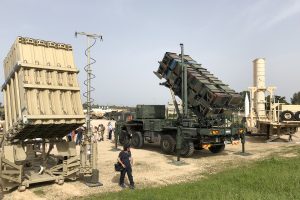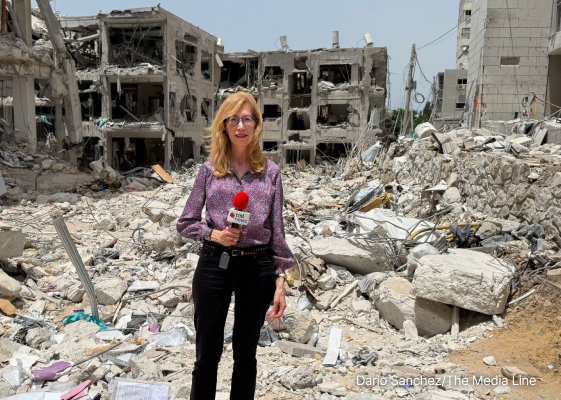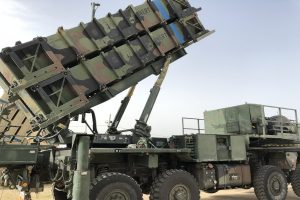IDF also plans “Solid Stand” home front command drill this week; emergency sirens to sound throughout the country
Juniper Cobra 2018 continues in Israel, the largest joint U.S.-Israeli air defense military exercise in the country. Held every two years since 2001, it brings together some 4,500 IDF troops and American military personnel.
The exercise includes computer simulations of ballistic missile and rocket attacks on Israel.
This year, Israel’s anti-missile defense batteries were on display for the media at Hatzor Air Force Base in central Israel; namely, the Iron Dome, David’s Sling, Patriot and Arrow 2 and 3 systems.

“We will practice and train shoulder to shoulder like we would fight,” IDF Brig. Gen. Zvika Haimovitch, head of the IDF’s Aerial Defense Division said, adding that both armies are preparing and practicing for “multi-directional threats.”
Gen. Haimovitch was joined by Lt. General Richard M. Clark, USAF 3rd Air Force commander.
“Our country has committed, our senior leaders have committed, that when requested by the Israeli government, we will be ready to execute and to be here,” General Clark asserted, before noting that, depending on the scenario, U.S. forces could be ready to mobilize from European bases to Israel within 72 hours.
Give the gift of hope
We practice what we preach:
accurate, fearless journalism. But we can't do it alone.
- On the ground in Gaza, Syria, Israel, Egypt, Pakistan, and more
- Our program trained more than 100 journalists
- Calling out fake news and reporting real facts
- On the ground in Gaza
- Covering Israel, Syria, Lebanon
- More than 100 students
- Exposing fake news
Join us. Support The Media Line. Save democracy.


Asked by The Media Line if there was a greater sense of urgency in 2018 given the tense situation along Israel’s northern fronts with Lebanon and Syria and in the south with the Gaza Strip, Gen. Clark said every exercise “practices all the relevant threats.”
Among the greatest such threats are increasingly accurate projectiles, with Hizbullah, for example, estimated to have an arsenal of as many as 150,000 missiles and rockets.
Military officials would not say if the Juniper Cobra exercise is geared toward any specific threat aimed at Israel, with General Clark instead contending that there “could be thousands.”

The Media Line passed a convoy of American armored personnel carriers, APC’s, during the training last week. Re-supply movements are also part of the exercise this year, according to officials.
The IDF is also conducting a general staff exercise this week, which is unrelated to Juniper Cobra 2018, to “enhance its ability to respond to emergencies.” The Home Front Command will carry out a drill named “Solid Stand” throughout the country.
“The objective of the general staff exercise is to enhance the headquarters’ response to a variety of emergency and warfare scenarios and to improve the readiness and operational communication between the commands,” an IDF press release read.
It added that, “the objective of this year’s exercise is to improve Israel’s ability to respond to threats on both a national and local scale. Home Front Command forces will train alongside national Emergency Management Authority personnel, local authorities, Israeli security and rescue forces, the education system and both public and private organizations”.
As part of the drill, an alarm will sound throughout Israel between the hours of 11:05 and 19:05 (local time) on Tuesday, March 13th, according to the IDF statement.
Among the communities that will hear the sirens is Moshav Netiv HaAsara, along the northern Gaza border.
The nearly two-foot thick and 30-foot-high border walls protect the town from Hamas sniper fire and mortar attacks.
Sections of the wall are covered with mosaic tiles, part of the “Path to Peace” project started by artist and resident Tsameret Zamir.
“First they hear the story about life here in this village, and just after that, at the end, each one chooses one stone, [on which to] write his own wish on the back then glue it,” she explained to The Media Line; this, as students joining her on a tour of the wall took pictures while placing mosaic tiles and stones with various names and messages along it.
Zamir says she has been teaching children about her project for six years.
“I’ve lived in this village the last 20 years and sometimes it’s very scary, but still it’s our home and we raise our kids here, and we love, very much, our home,” she said. “We try to be strong and stay here.”
That seems to be a prevalent feeling among many residents of Israel’s border communities, either during time of war, peace or during the massive military exercises that see troops rolling through their communities like Juniper Cobra.
Perhaps the juxtaposition of images says it best: “Don’t worry be happy” written on the inside of a military bunker overlooking the Gaza border.